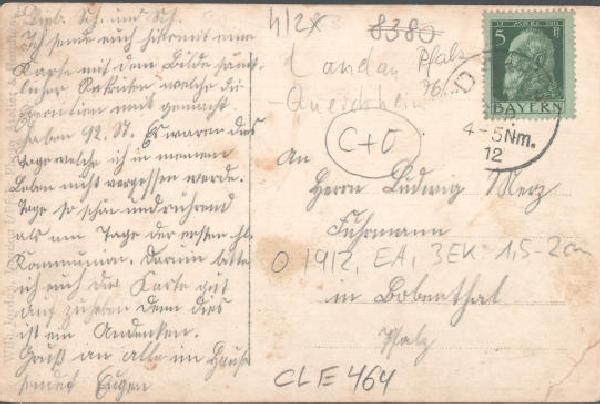
Message on Officer Training Photo Postcard (1912)

Figure 1.--The caption to the 1912 postcard read "Remembering a typical group of recruits in a training class at St. Paul's College in Lower Queichheim." Queichheim is a picturesque village in the Rhineland. I believe these youths have volunteered for officer training. Here is the message written on the back.
|
|
The caption to the 1912 postcard read "Remembering a typical group of recruits in a training class at St. Paul's College in Lower Queichheim." Queichheim is a picturesque village in the Rhineland. I believe these youths have volunteered for officer training. Here is the message written on the back which a HBC reader has kindly translsted for us.
Again a challenge here. Several of the words are difficult to read on account of age and of penmanship of the writer and the poor quality scan. . Well, I tried my best and came up with the following translation:
"Dear ???? ?????,
I am pleased to forward a card with the picture of our recruits who participated. Reminiscences which I will not forget in my life. As beautiful as the day of my first holy communion. Therefore I ask you to safe guard this card, because it is a keepsake. Greetings to all in the (....service?). Eugen"
I find the sentiment here rather difficult to understand. I know that when I was drafted and went ino the military, it was not the same as a treasured childhood memory. Of course this was a different time and place and Eugene, the young man here, was a volunteer, but comparing military training to his First Communion rather startled me.
It is interesting that a Bavarian (Bayern) stamp has been used instead of a German one. This shows how before the NAZIs how the various German states (especially Bavaria) retained considerable autonomy.
The addressee is Mr. Ludwig Merz, Fuhrmann in Lobenthal, Pfalz. The community must have been so small that there is no street address. That's why the sender mentioned the occupation of the addressee. A Fuhrmann is a driver, but in this case I think he is a waggoner on a carriage pulled by a horse, because the psttcard was made in 1912. Pflaz is the Palatinate in Southwestern Germany, near Bavaria. The military training, however, took place in the Rhineland.
A reader writes, "Now that you mention it, yes, it is rather funny to compare becoming a recruit in the army with a first holy communion. I believe life at the time must have been kind of dull for most people. That's why both events are experienced as something exciting. But thinking about it, war always has been associated with religion. Wirld War 1 German soldiers displayed the words ' GOTT MIT UNS ' (God with us) on their beltbuckles, weapons were blessed by the clergy and on every side of the battle God was asked to bring the troops to victory." I think it is true tht the Germans as well as the other beligerants were convinced, at least at the beginning of the War, that God was with them. I don't think that many American soldiers would have equated First Communion or other beautiful childhood experience with military training. I'm less sure about other countries are in fact how representative Eugene was of German soldiers in general. It is certainly an interesting statement.
HBC

Navigate the Boys' Historical Clothing Web Site:
[Return to Main postcard page]
[Return to Main German conscription and student groups page]
[Return to Main World War I people page]
[Introduction]
[Activities]
[Biographies]
[Chronology]
[Clothing styles]
[Countries]
[Bibliographies]
[Contributions]
[Essays]
[FAQs]
[Glossaries]
[Images]
[Links]
[Registration]
[Tools]
[Boys' Clothing Home]
Created: 6:27 AM 12/20/2007
Last updated: 6:27 AM 12/20/2007



